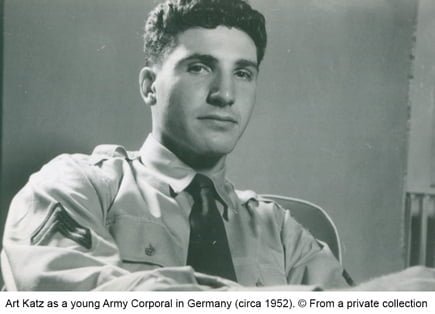Art Katz first arrived in Europe—Catania in Sicily—as a self-described tall, cocky, seventeen-year-old merchant seaman in 1946. The shock of surveying the ashes and wreckage from World War II drove him back to Brooklyn where, a few years later, he was drafted into the Army and returned to Germany as part of the American army’s “occupation” in late 1951.
His initial arrival in Europe had shattered any idyllic hopes for adventure, according to his autobiography. He was horrified as he surveyed the town with its gutted harbor and half-submerged, broken skeletons of ships and zombie-like civilians trudging past piles of garbage, stopping to forage through the same rubble that they’d scavenged through the previous day. He rarely made mention again of his disillusionment at the squalor and destruction from three years caused by the pulverizing by the Allied and German barrages during landings. He groped for explanation, numbed by an eerie impression that some vicious inhuman fist had smashed everything in a fit of indescribable hatred. Death prowled invisibly past collapsed buildings, alleys, and waterfront debris.

Any jubilation had been short-lived in Catania and throughout Sicily following liberation after German occupiers fled in 1943—just ahead of British and American troops who, after ridding the countryside of one enemy, resumed another occupation by foreigners. The war had eventually ended and to be followed by two tortuous decades of “reconstruction”, economic booms-and-busts, a plague of crime, neo-fascist outbreaks and, briefly, civil war. Governmental paralysis provoked massive civilian migrations to northern Italy and abroad through the end of the 20th Century, as the generalized weariness gradually subsided, allowing tedious rebuilding and social reforms.
But, the occupations—whether by German and Allied troops, the home-grown insurrections or local gangs—had seemed peculiarly cruel, excessive and strangely living force that stifled a return to any life in Catania and across the rest of Sicily.
“…The famous parable has no military nor warfare implications. Or does it?“

With few exceptions “peace-time” transitions for nations and regimes are rarely without lengthy aftershocks of harsh poverty, plunder, and violence. The stigma of military occupation is historically negative if not worse—for resentful civilians and abusive though equally entrapped soldiers!
Katz’s ancestors 1,900 years earlier had subsisted under Roman “occupation” that, according to most historians, lasted from 63 B.C. until 410 A.D., and had included the infamous judgment and destruction of Jerusalem in 70 A.D.
The single reference to “occupy” in the New Testament parable of the Nobleman (Luke Chapter 19) was spoken by Jesus to show the higher spiritual expectations of fidelity and diligence in advancing His Kingdom.
Conventional commentaries seem to agree that the scant uses of “occupier” and “occupation” in the scriptures applied instead to business and secular pursuits. Especially, in the example of the Nobleman’s servants who were charged to be wise and fruitful in their expansion and management of his “business” holdings and profits until he returned from traveling to a “far country” (Luke 19).
At first glance, the famous parable has no military nor warfare implications. Or does it?
However, conducting routine “business” under the eyes of Roman occupation troops was risky enough, as is the reality now in everyday cutthroat commerce that is characterized as war-like with myriad human casualties and irreversible environmental corruption. Empires rise and topple in the fever of Mammon-worship while the environment suffers simultaneous mayhem.
Even so, the desperate, wicked and chaotic conflict being waged in unseen realms by the enemy finds the church languishing further into spiritual enfeeblement—forsaking the responsibility to “wrestle not against flesh and blood, but against principalities, against powers, against the rulers of the darkness of this world, against the spiritual wickedness in high places.” (Ephesians 6)
Even so, the desperate, wicked and chaotic conflict being waged in unseen realms by the enemy finds the church languishing further into spiritual enfeeblement—forsaking the responsibility to “wrestle not against flesh and blood, but against principalities, against powers, against the rulers of the darkness of this world, against the spiritual wickedness in high places.” (Ephesians 6)
“One of the scandals of contemporary Christianity…“
“Spiritual warfare” remained an intensifying theme cited by Art Katz toward the latter years of his long international ministry, whether in London, on many occasions in Germany, or far-flung locales of The Ukraine, Africa, India, Southeast Asia, South and Central America, San Francisco, New York City, in Onalaska, Wisconsin, or at home on Chippewa Tribal lands in northern Minnesota. He ceaselessly warned the church about its unseen enemy and the insidious reality of the spiritual strongholds of evil:
“One of the scandals of contemporary Christianity is the negligence to appropriately ‘teach’ the importance of spiritual warfare, especially in these Last Days when Principalities and Powers and the innumerable, rebellious ‘angels’ and fallen spirit beings plot ruin and instigate genocidal horrors worldwide.”
Truly, unseen realms over the nations swarm with hosts of demon antagonists desperately determined to pervert governments, institutions, societies and races. They deceive and animate earthly life among mankind which is tragically unaware of the brutal harassment and varieties of enslavement.
Although warfare is a constant theme throughout biblical history, Jesus’s confrontation with demons and the Principalities and Powers was no bidding to wage open war with the Romans by Jewish zealots nor between classes and factions of fellow humans.
Rarely was the topic more comprehensively portrayed or concisely presented as in the chapter, entitled “The Powers of Darkness,” in his new book–The Final Mystery: Israel & the Church. For more information on how to obtain a copy of this First Edition, click on http://artkatzministries.org/online_bookstore/books
Why a “war college” and considerations of “spiritual warfare” at Ben Israel?

Yes. Considering the past ‘schools’ conducted on the cutting-edge themes of things “apostolic” and/or “prophetical” …Why, indeed? The answer, as it quickly became apparent in later decades when the “charismatic movement” had become bloated, increasingly self-celebrating, lapsing ever closer to irrelevance, or worse!─was obvious, and compelling. Art Katz began a succession of ‘schools’ during summer months at Ben Israel that focused on the foundational crisis of leadership and authority in the church.
Our wholesale spiritual bankruptcy and corruption confesses our present decimation of fundamentalist and evangelical ranks, movements and denominations, exceeding any merely passive or religious sloth and secular abandon. True faith has been robbed by the “tradition of men” as a determined and desperate adversary fearlessly rampages and ravages throughout but unacknowledged and unidentified despite Biblical warning, growing and unprecedented evidence and an untapped and apparently ignored abundance of available teaching and timely literature!
Accordingly, this summer’s three “war college” sessions (July 25-27, August 29-September 1, September 26-28) intended to modestly explore this sober theme of “spiritual warfare”, deliverance, and the root issues of Powers and Principalities.